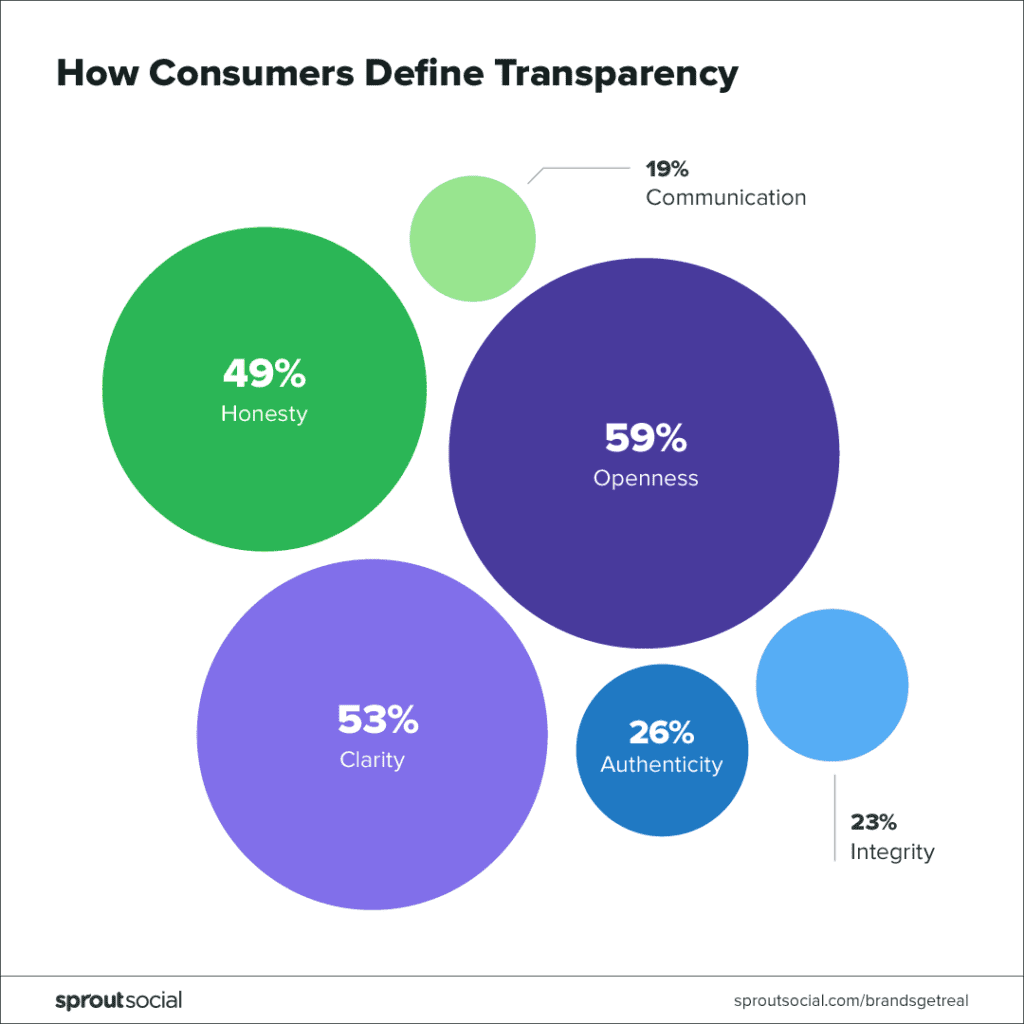Bill Hicks once famously suggested that marketing was one of the biggest evils of the modern age.
I won’t share his conclusions here as they were pretty toxic. However, his rage was directed at something perfectly reasonable: the tendency in marketing to add spin to things. To manipulate and twist people to do your will as a marketer (i.e. buy your s%*t).
Over the years, a lot of research has led to some radical conclusions: the more up-front you are, the better.
So, what exactly is the transparency effect?
In simple terms, it refers to the practice of being open, honest, and authentic in all aspects of a brand’s communication and operations. It encompasses the concept of revealing the inner workings of a company, making information accessible, and fostering an environment of trust between brands and consumers.
Why is the transparency effect effective?
It’s easy to gloss over Meta’s past mistakes in the field of honesty given all the hype recently about the Metaverse and the future of VR. But, let’s just remind ourselves that before 2022, Meta came under fire for how it handled data. Then, there was the big scandal with Cambridge Analytica.
The consequences of Meta’s screwup weren’t insignificant. For the first time in the company’s history, they had to admit that instead of user growth, they were in decline. Forgive my cynicism here but I wonder how much this has factored into the hype surrounding the Metaverse? Is it just a case of smoke and mirrors to distract from declining user bases due to a lack of transparency?
The marketplace votes with its feet. The Meta situation is high-profile proof of that. When it comes to transparency, clearly the market values it!
I think the reason transparency is so effective in marketing boils down to:
- Trust
Catholic theologian and philosopher Charles Taylor characterised our present cultural era as the “age of authenticity” and coined the term, “expressive individualism” (Charles Taylor 2007). He identified that nothing would be more important in this era than authentic expressions of self.
A natural byproduct of authenticity is trust which tracks exponentially. The more open, authentic and human you can be in your marketing, the more likely you are to build trust.
2. Growth
There have been a series of well-publicised studies concluding that consumers are willing to spend more on a transparent brand than one that is less transparent but better priced. That’s research worth paying attention to. If consumer spending power is biased towards transparency, it’s in your growth interests to model transparency.
3. Loyalty
Loyalty is a lovely byproduct of trust. The more someone trusts you, the more likely they are to buy from you again. If that next experience affirms their trust, the loyalty will inevitably grow.
4. Reputation
The compounding interest in building openly, authentically and transparently is that your reputation will grow with you.

How can I employ this strategy?
We’re a big fan of the concept of building in the open. This literally means pulling back the curtain on your internal processes and sharing that with the public.
A lot of people hear this and instantly object, “We’ve got highly secretive processes, we can’t share that stuff because we’ll be copied”. I hear that objection and I don’t want to be fickle about it. However, most people are far too lazy to actually copy you. Even if they did, you’re ahead of them.
But, if revealing all your secrets really isn’t the way forward here are a few more things you could do:
- Increase your social output: Go behind the scenes, get staff to post “day in the life” content, and show some of the not-so-secret secrets off (maybe a tease image of an NPD meeting etc).
- Have real, raw and honest answers prepared for potentially embarrassing questions (and don’t be a politician about it).
- Be available for conversations with your consumers.
- Share when you break new transparency ground. Share how you are tackling issues within your organisation you’re aware of (and be brave about talking about it).
Remember, nobody (not even your head of marketing or CEO) really believes your brand is entirely infallible. Be prepared to act as if your brand was fallible to increase transparency and bank the ROI that comes with the transparency territory.
Final thoughts…
Overall, integrity and honesty make for good marketing in this age of authenticity.
What are the opportunities available to you to be more transparent in your marketing?
What has held you back from being transparent in the past?
What are the current obstacles to transparency in your business?
